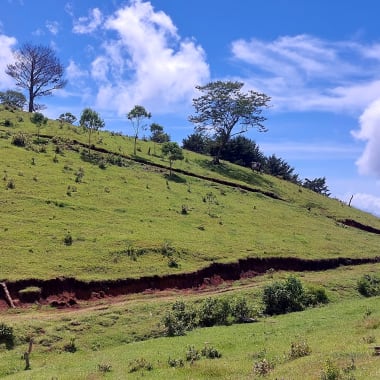-
Producer
-
Rianjagi Farmers Cooperative
-
Country
- Kenya
-
Region
-
Embu
-
Altitude
-
1605-1625m above sea level
-
Varieties
-
Process
-
Harvested
-
December 2018
-
Importer
-
Cafe Imports
-
Body
-
Medium
-
Acidity
-
Bright
-
Tasting notes
-
Cranberry, stewed peach, sherbert
-
Roast style
Kenya
Rinjagi
Rianjagi factory is owned and operated by the Rianjagi Farmers Cooperative Society, which was built in 1950.
It’s now made up of just over 1,500 member farmers, and the cooperative is managed by a board of five elected representatives, one for each of the electoral zones in the area. The co-op also has a permanent staff of eight who are overseen by a secretary-manager.
Coffee is delivered by local farmers the day that it’s picked, and is sorted for quality at the mill before being depulped and processed. After de-pulping, the coffee is fermented overnight and washed with fresh river water, then placed on drying tables.
Learn everything about this coffee:
Ethical, traceable sourcing
This page has all the sourcing information (variety, process, region, story, importer, and more) that our importers share with us, and give us permission to use.
The transparency helps us talk confidently about the quality and background of our product, and it helps you know exactly what you’re buying.
Learn more:
Coffee page transparency legend
Our coffee philosophy
Our business approach
Fresh harvest coffee
We only source and roast coffee from each country’s latest harvest season (so the green coffee is never older than 1 year from the time of picking, processing and packing). This ensures the sensory qualities are always at their peak and unaffected by excessive ageing.
Roasted for espresso and filter (best enjoyed black)
Roast style: omni. Omni roasts are designed to brew and taste great both as espresso and filter. Our omni single origins generally sit on Agtron values in the ~70-60 value range. So, technically, they are somewhere in the lighter side of the medium spectrum.
Designed for espresso and filter brewing. Best enjoyed black.
Learn more:
Our Loring Kestrel S35 roaster
Our roasting style and approach
Best brewed within days 15-49 post-roast
The ‘fresh is best’ saying doesn’t apply to coffee (contrary to popular belief). Waiting before opening and brewing your bag of whole coffee beans helps develop peak flavour and acidity.
But heads up: if you buy pre-ground coffee, brew it as soon as possible.
Learn more:
Our recommended brewing window
Try our custom brewing recipes
Our recipes and ratios are tailored to our coffee sourcing and roasting styles, bringing the best flavour and feel out of each coffee.
For pour over, immersion, and other filter brewing styles, check our brew guides.
For our espresso single origins, we recommend a coffee:yield ratio of 1:3:
- Dose: 20g ground coffee
- Yield: 60g espresso
- Total brew time: ~24-28 seconds
This is just a starting point! We encourage you to experiment, taste, and adjust to find the recipe that you enjoy the most.
Learn more:
Our espresso brew guide (single origin)
Brewing ratio calculator
Packaging and sustainability
- Bags: ABA-certified home compostable (AS 5810-2010)
- Labels: recyclable
- Valves (only on +250g bags): general waste
- Box and tape (online orders): recyclable
Learn more:
Our packaging
Varieties
Batian variety
Batian is the latest variety to be developed in Kenya, it is named after the peak of Mount Kenya
Ruiru 11 variety
Released in 1985, Ruiru 11 is a disease resistant varietal developed in Kenya
SL28 variety
SL28 was developed in 1931 by Scott Laboratories to suit the growing conditions in Kenya. The varietal is known for its exceptional cup quality
SL34 variety
Developed by Scott Laboratories in Kenya, the SL34 varietal was designed to be high yielding with good cup quality.
The location
Coffee from Kenya
Alongside Ethiopia and Colombia, Kenya is one of the origins we get most excited about at the roastery. It exports some of the most vibrant, bright, and unique coffees in the world.
The Embu region of Kenya
Named after the town of Embu, also near Mount Kenya and its fertile growing conditions
Farm processes
Washed process
Machines are used to remove the flesh from the coffee cherry before being fermented in water, washed again, and finally sun dried. This process tends to result in more distinct, cleaner flavours.

Subscribe to a world of coffee
Discover a new single origin coffee from Sample every 1-5 weeks with no delivery fees.
No up-front purchase, and you can pause, cancel, or change plans at any time.
Available to order online this week:

Peru Miguel Estela
Flavours of honeydew melon, white grape, marmalade
Body Acidity
Washed Marshell
August 2025 harvest
Roasted omni for filter and espresso
Peru Miguel Estela online
Colombia Rigoberto Chavarro
Flavours of brown sugar, wine gum, candied stone fruit
Body Acidity
Washed Pink Bourbon
February 2025 harvest
Roasted omni for filter and espresso
Colombia Rigoberto Chavarro online
El Salvador Manuel Castañeda
Flavours of toffee apple, cranberry, dulce de leche
Body Acidity
Honey Pacamara
March 2025 harvest
Roasted omni for filter and espresso
El Salvador Manuel Castañeda online
Mexico Isavel Lopez Pablo
Flavours of blueberry, dried cranberry, white peach, nectarine
Body Acidity
Washed Typica
April 2025 harvest
Roasted omni for filter and espresso
Mexico Isavel Lopez Pablo online